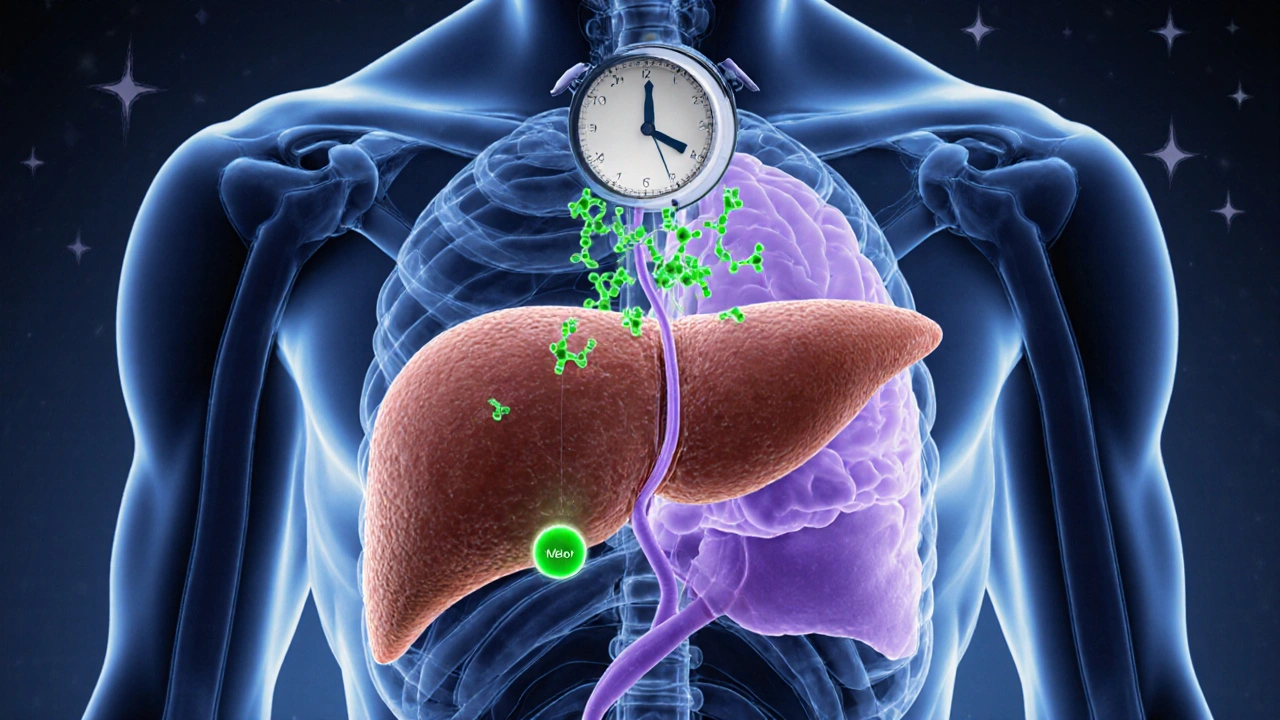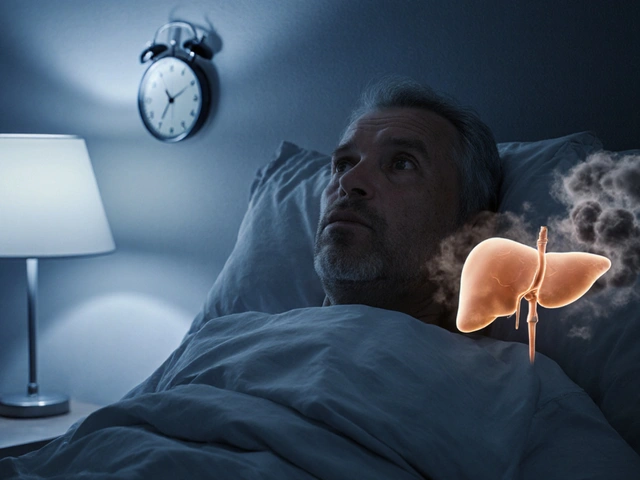Liver Failure & Sleep Symptom Checker
Your Results
Common Sleep Issues in Liver Failure:
Insomnia
Trouble falling or staying asleep, often linked to high ammonia levels.
Daytime Sleepiness
Feeling tired despite adequate sleep due to toxin buildup.
Restless Legs
Uncomfortable sensations that worsen at night in chronic liver disease.
Fragmented Sleep
Disrupted REM sleep affecting restorative rest and mood.
When the liver starts to fail, you might notice more than jaundice or fatigue - your nights can become a battlefield. Poor sleep isn’t just an inconvenience; it can worsen liver damage and speed up complications. Understanding the two-way street between liver health and sleep lets you break the cycle before it hurts you further.
What Is Liver Failure?
Liver failure is a condition where the liver loses the ability to perform essential tasks such as detoxifying blood, producing proteins, and regulating metabolism. It can be acute (sudden, often due to overdose or viral hepatitis) or chronic (gradual, usually from cirrhosis, fatty liver disease, or long‑term alcohol use). Doctors grade severity with scores like the Child‑Pugh classification and the Model for End‑Stage Liver Disease (MELD) score, both predicting survival and transplant priority.
How the Liver Influences Sleep
Even though the liver isn’t a brain organ, it talks to the nervous system constantly. It clears ammonia and other toxins that, if accumulated, can cross the blood‑brain barrier and impair neurotransmission. The liver also helps regulate the hormone melatonin, the nightly cue that tells your body when to wind down. When liver cells are damaged, melatonin breakdown slows, leading to higher nighttime levels that paradoxically cause fragmented sleep.
Another piece of the puzzle is the circadian rhythm. Circadian rhythm is the internal 24‑hour clock that synchronizes hormone release, body temperature, and metabolism. The liver follows this rhythm, ramping up detoxification during the day and slowing at night. Failure throws this schedule off‑balance, sending mixed signals to the brain about when to be alert or sleepy.

Typical Sleep Problems in Liver Failure
- Insomnia: Trouble falling or staying asleep, often linked to high ammonia levels.
- Excessive daytime sleepiness: Even if you manage a few hours at night, toxins can make you nod off during the day.
- Restless‑leg‑like sensations: Common in chronic liver disease, worsening nighttime discomfort.
- Fragmented REM sleep: Less deep restorative sleep, which fuels fatigue and mood swings.
Why Hepatic Encephalopathy Matters
Hepatic encephalopathy is a neuro‑cognitive syndrome caused by the liver’s inability to clear toxins, especially ammonia. Early signs include subtle changes in sleep pattern - you might start sleeping longer but feeling groggy. As encephalopathy progresses, patients experience stupor and confusion, making it hard to maintain any regular sleep schedule. Treating the underlying toxin buildup (lactulose, rifaximin, or dietary protein adjustments) often restores a more normal sleep‑wake cycle.
Practical Steps to Improve Sleep
Below are evidence‑backed habits that address the root causes rather than just masking symptoms.
- Screen for ammonia spikes: Get regular blood tests. If levels are high, your doctor may prescribe lactulose, which traps ammonia in the gut.
- Consider melatonin supplementation: Studies from 2023‑2024 show low‑dose melatonin (0.5-1mg) re‑establishes a regular rhythm in cirrhotic patients without worsening liver load. Always discuss dosing with a hepatologist.
- Adopt strict sleep hygiene: Keep the bedroom cool, dark, and free of screens at least an hour before bedtime. Use a white‑noise machine if you have tinnitus from portal hypertension.
- Manage fluid overload: Ascites (fluid build‑up in the abdomen) can make breathing uncomfortable at night. Sodium restriction and diuretics can reduce nighttime awakenings.
- Optimize protein intake: Too much protein raises ammonia; too little worsens muscle wasting. A balanced 0.8g/kg body weight split between plant‑based sources and low‑ammonia animal protein is ideal.
- Exercise lightly: A 20‑minute walk after dinner speeds up gut motility, helping lactulose work faster and improving sleep depth.
- Address mental health: Anxiety and depression are common in chronic illness and can keep the mind racing. Cognitive‑behavioral therapy for insomnia (CBT‑I) has shown a 30% improvement in sleep efficiency for liver patients.

When to Seek Professional Help
If you notice any of the following, call your liver clinic ASAP:
- Sleep lasting longer than 10hours but you still feel exhausted.
- Sudden onset of confusion, slurred speech, or difficulty concentrating.
- Repeated nighttime awakenings with a feeling of choking - a sign of severe ascites.
- Persistent leg cramps that disrupt sleep for more than three nights in a row.
Early intervention can prevent progression to overt hepatic encephalopathy and may lower your Child‑Pugh or MELD scores, improving transplant eligibility.
Quick Checklist: Boost Sleep While Managing Liver Failure
- Check ammonia levels every 3‑6months.
- Take 0.5-1mg melatonin at 9pm (if approved).
- Limit sodium to<2g/day; avoid late‑night salty snacks.
- Keep bedtime and wake‑time consistent-even on weekends.
- Use a night‑time bathroom routine to reduce nocturia.
- Schedule a nightly walk after dinner.
- Consult a hepatologist before adding any new supplement.
By treating the liver and the sleep system together, you break the vicious cycle that turns a night of tossing and turning into a health setback. Remember, the goal isn’t just a few extra hours of shut‑eye - it’s a stronger liver, clearer mind, and better quality of life.
Frequently Asked Questions
Can liver failure cause insomnia?
Yes. Toxin buildup, especially ammonia, disrupts neurotransmitters that regulate sleep, leading to difficulty falling or staying asleep.
Is melatonin safe for people with cirrhosis?
Low‑dose melatonin (0.5‑1mg) is generally safe and may help reset the circadian clock. Always discuss dosage with your liver specialist.
What is the link between ammonia and daytime sleepiness?
High ammonia crosses the blood‑brain barrier, depressing the central nervous system. This leads to sluggishness and an increased tendency to nap during the day.
How does the Child‑Pugh score affect sleep recommendations?
A higher Child‑Pugh score (C) indicates more severe liver dysfunction, often accompanied by hepatic encephalopathy. Patients in this range need stricter toxin control and may benefit from professional sleep‑medicine referral.
Should I avoid caffeine completely?
Moderate caffeine (1‑2 cups) is usually fine, but excessive intake can increase anxiety and worsen insomnia, especially if liver metabolism is impaired.


Jonathan Lindsey
October 7, 2025 AT 15:05Ah, the delightful dance between a failing liver and that elusive thing we call sleep-truly a masterpiece of medical irony. While you might think merely tossing a pillow will solve the problem, the reality is that elevated ammonia levels masquerade as insomnia, robbing you of restorative REM cycles. Of course, the solution is as simple as a daily lactulose regimen and a meticulously timed 0.5 mg melatonin dose, because who doesn’t love a prescription schedule that reads like a nuclear launch code? Moreover, maintaining a sodium‑restricted diet not only curtails ascites but also reduces nocturnal leg cramps, which, let’s face it, are the universe’s way of reminding you that your liver isn’t cooperating. In short, adopt the strict sleep hygiene protocol, monitor blood work like a hawk, and perhaps enjoy the occasional sarcastic grin at the absurdity of it all.
Gary Giang
October 10, 2025 AT 05:35The liver’s nocturnal gossip is oddly poetic, isn’t it?
Think of the organ as a night‑shift bartender, swapping toxins for tranquility, only to spill the beans when its shift ends. A splash of melatonin and a pinch of sodium‑control can turn that raucous bar into a serene lounge.
steve wowiling
October 12, 2025 AT 20:05Sleep, in the grand theater of existence, is the curtain that rises after the liver has taken its bow on the stage of metabolism. When that bow is stumble‑laden, the audience-your brain-receives an encore of ammonia‑infused whispers that keep you tossing like a ship in a storm. First, consider the basic premise: the liver detoxifies, and when it falters, detoxification stalls, leading to neurotoxic buildup. Second, the very hormone that tells you it’s bedtime-melatonin-gets stuck in a feedback loop, lingering far beyond its appointed hour. Third, the circadian rhythm, that elegant 24‑hour metronome, loses its tempo, and you find yourself awake at midnight pondering the meaning of life while your liver sighs in defeat. Fourth, the physical manifestations-restless legs, fragmented REM, daytime somnolence-are merely the surface ripples of a deep, systemic swamp. Fifth, the scientific literature from 2023‑2024 confirms that low‑dose melatonin (0.5‑1 mg) can gently coax the clock back into synchrony without overburdening the compromised hepatocytes. Sixth, lactulose remains the stalwart guardian, corralling ammonia in the gut and granting the brain a fleeting reprieve. Seventh, dietary protein must be balanced; too much catapults ammonia levels, too little fuels muscle wasting, a delicate equilibrium that requires the wisdom of a seasoned dietitian. Eighth, modest exercise after dinner-perhaps a 20‑minute stroll-stimulates gut motility, enhancing lactulose efficacy and inviting deeper sleep. Ninth, the psychosocial dimension cannot be ignored: anxiety, depression, and the existential dread of chronic illness are potent insomnia catalysts. Tenth, cognitive‑behavioral therapy for insomnia (CBT‑I) has emerged as a non‑pharmacologic champion, improving sleep efficiency by roughly thirty percent in hepatic patients. Eleventh, fluid management-limiting sodium, judicious diuretic use-alleviates ascites‑induced nocturnal dyspnea, allowing uninterrupted breaths. Twelfth, the timing of medication matters; taking melatonin at 9 p.m. aligns with endogenous peaks, whereas late‑night dosing may worsen sleep fragmentation. Thirteenth, regular ammonia monitoring every three to six months provides the feedback loop needed to adjust therapy before encephalopathy looms. Fourteenth, family and caregiver support act as the silent backstage crew, ensuring adherence and emotional steadiness. Fifteenth, remember that each night’s sleep is a micro‑reset for hepatic function, a chance to slow the inexorable march toward overt encephalopathy. Finally, embrace this holistic regimen, for in the interplay of liver health and slumber lies the true path to reclaiming vitality.
Warren Workman
October 15, 2025 AT 10:35While the consensus touts melatonin and lactulose as panaceas, one must question whether we’re merely applying a one‑size‑fits‑all protocol to a heterogeneous pathology. The hepatic encephalopathy spectrum varies dramatically, and the pharmacokinetics of melatonin in cirrhotic patients remain under‑characterized, potentially leading to supratherapeutic plasma levels and paradoxical insomnia. Moreover, the emphasis on sodium restriction overlooks the emerging data suggesting that modest sodium intake may preserve intravascular volume and prevent renal hypoperfusion, a common complication in advanced cirrhosis. Hence, a nuanced, patient‑specific approach-perhaps integrating rifaximin early and tailoring dietary sodium-could supersede the blanket recommendations.
Kate Babasa
October 18, 2025 AT 01:05Thank you for the thorough overview; indeed, liver health and sleep are intertwined; good luck!
king singh
October 20, 2025 AT 15:35I totally agree with the practical steps outlined-regular ammonia screening, low‑dose melatonin, and careful fluid management can make a real difference. It’s also helpful to keep a sleep diary to track patterns and discuss them with your hepatologist during visits. Together, these strategies form a solid foundation for better rest.
Adam Martin
October 23, 2025 AT 06:05Oh great, another checklist-because what every liver patient really needs is another list to ignore after work. Still, I’ll give credit where it’s due: monitoring ammonia and cutting sodium are solid moves. The melatonin tip? Sure, if you enjoy chewing on tiny pills at bedtime while your liver protests. And hey, a 20‑minute walk after dinner isn’t a bad idea-unless you’re too tired from nightly awakenings, in which case, good luck with the ‘exercise’ part.
Ryan Torres
October 25, 2025 AT 20:35💊👀 Ever notice how the pharma giants push melatonin as the miracle fix? They want you to buy another supplement while they keep the real toxins flowing. 🤔 Keep an eye on your ammonia levels, but also question why the “official” guidelines never mention hidden pollutants in processed foods that sabotage liver detox. Stay vigilant! 🛡️
shashi Shekhar
October 28, 2025 AT 10:05Well, look at you, trying to sound all scientific while ignoring the simple truth: your liver is a mess, and no amount of jargon will fix it. Honestly, if you think a tiny melatonin pill will cure anything, you’re just feeding the industry’s profit machine.
Marcia Bailey
October 31, 2025 AT 00:35Hey, I get the frustration-dealing with chronic liver issues can feel like fighting a losing battle. 😊 Remember, though, that consistent monitoring and small lifestyle tweaks can still provide real relief, even if they don’t solve everything overnight.
Hannah Tran
November 2, 2025 AT 15:05Absolutely, the liver’s “night‑shift” analogy hits the nail on the head. To add, integrating a consistent sleep schedule-same bedtime and wake‑time-even on weekends, can reinforce the circadian rhythm and ease the metabolic load.
Crystle Imrie
November 5, 2025 AT 05:35Honestly, all this talk of supplements feels like a distraction from the core issue: get your doctor to adjust lactulose dosage before you start chasing melatonin.
Shelby Rock
November 7, 2025 AT 20:05i think its realy importnt 2 re think how we treat liver failur and sleep. its not jus about pills but about how we live day to day. small changs in diet, less stress and a good night routine can do more then a dozen meditations.
Dhananjay Sampath
November 10, 2025 AT 10:35Well said!; indeed, a holistic approach-balanced nutrition, proper sleep hygiene, and regular medical follow‑up-creates the best environment for hepatic recovery; keep it up!